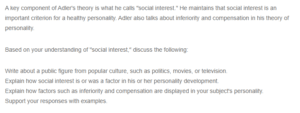Social Interest in Speech and Language Development
Social interest is an intrinsic capacity in all human beings trained to develop speech and language (Olson, Favero & Hergenhahn, 2019). Therefore, it is key to personality development because a person’s speech and language talk much about them and what they can achieve when given the opportunity. The popular figure chosen is Queen Elizabeth II. Queen Elizabeth II is celebrated for her eloquence in speaking French. She was also a good motivational speaker who would captivate and encourage her audiences through rhetorical word choices to gain and attain their support.
Need help with your assignment? Get in touch with us.
Therefore, because of her choice of words, social interest was a factor in Queen Elizabeth II’s personality. For instance, Queen Elizabeth II once spoke before the United Nations. She said, “I hope that when adjudicated by future cohorts, our honesty, readiness to take the lead, and our fortitude to do the right thing will stand the test of time” (Doeden, 2020). These words virtually demonstrated the importance of the character of Queen Elizabeth II of the U.K., a primary cornerstone that British distinctiveness had been built for the past 70 years. It is not by chance that the phrase “London Bridge has fallen” was used as a code to announce the Queen’s death. This visual allegory exemplifies the backing of the monarchy. Through it, the Queen gained exceptional respect, admiration, and respect of the Britons for herself and the institutions she steered over the years.
Again, even if Elizabeth II was an introvert, that was what the royal personality expected of her. Elizabeth’s leadership was never founded on her authority but rather on a relationship of conviction with the Britons, who perceived in their leader an individual ready to acclimatize to change, true to her principles, and concerned with the society’s wellbeing (Günther, 2019). For example, her consistent and natural nature was key to her triumph.
Factors such as inferiority and compensation are differently displayed in my subject. First, Queen Elizabeth II exhibited inferiority through her introverted character. Olson, Favero & Hergenhahn (2019) affirms that everybody has a sense of inferiority, and from childhood, everyone works towards overcoming inferiority by striving for superiority. Therefore, the Queen’s introverted character preferred to remain less active in seeking attention to herself and maintaining privacy. Many introverted persons holding offices take public attention as one of their roles and a sense of responsibility. Thus, public exposure is one of the social tasks that politicians admit with endurance. For example, the Queen’s hobby was riding alone with her dogs and horses, which offset all the media attention she got.
On compensation, Olson, Favero & Hergenhahn (2019) say that when persons experience inferiority emotions, they automatically experience a compensatory desire to strive for superiority. Consequently, individuals push themselves hard to overcome challenges and accomplish their goals. So, factors of compensation are displayed in the Queen’s personality through traits like being logical. Murzinova (2014) says Queen Elizabeth was a rational individual with a weakness for reason rather than feeling. Such a character sometimes means individuals come across as cold and distant. Therefore, highly rational persons can find empathising with other people’s emotions challenging. For instance, the Queen experienced two things ago: the tragic demise of Princess Diana in 1997, where emotion was very key, and the collapse of the Aberfan mine in 1966, when 28 adults and 116 children died. Here, the Queen was flexible, depicted emotions, and mourned the death of Prince Diana openly, but because of the breakdown of the Aberfan mine, she did not empathize openly (Günther, 2019). The other character that displays compensation is emotional stability. Queen Elizabeth had a quiet and composed personality that made her visitors feel more relaxed in her company, and more especially, her wry sense of humour made those dealing with her feel so happy and more rewarded.
References
Doeden, M. (2020). Queen Elizabeth II: Modern Monarch. Lerner Publications (Tm).
Günther, R. (2019). Autobiography, history and politics. In Marguerite Duras (pp. 1-22). Manchester University Press.
Murzinova, I. A. (2014). Dynamics of the characteristic” sense of humour” of the linguistic personality type” the British Queen.” Language and Culture, (2), 47-55.
Olson, M. H., Favero, D., & Hergenhahn, B. H. (2019). An Introduction to Theories of Personality (9th Edition). Pearson Education (U.S.).
ORDER A PLAGIARISM-FREE PAPER HERE
We’ll write everything from scratch
Question
A key component of Adler’s theory is what he calls “social interest.” He maintains that social interest is an important criterion for a healthy personality. Adler also talks about inferiority and compensation in his theory of personality.

Social Interest in Speech and Language Development
Based on your understanding of “social interest,” discuss the following:
Write about a public figure from popular culture, such as politics, movies, or television.
Explain how social interest is or was a factor in his or her personality development.
Explain how factors such as inferiority and compensation are displayed in your subject’s personality.
Support your responses with examples.
Cite any sources in APA format.

